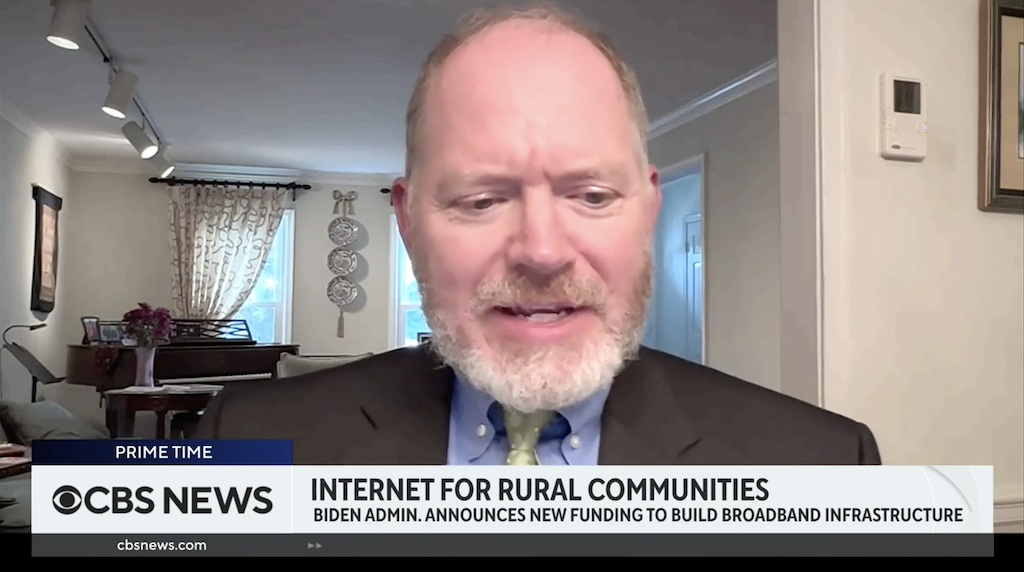FCC’s $68M for Schools and Libraries, NTIA’s $3.5M for Tribes, Broadband Breakfast on CBS
The ECF funds will go to 184 schools and 13 libraries serving over 100,000 students.
Jake Neenan

WASHINGTON, August 28, 2023 – The Federal Communications Commission announced on Aug. 23 that it will be disbursing a new round of over $68 million through its Emergency Connectivity Fund Program.
The money will go to 184 schools, 13 libraries, and two consortia – groups of schools and libraries that apply for funds together – across seven states serving over 100,000 students. It will be used to provide devices and internet connections to support nightly homework assignments and online summer programs.
The fund was opened to applicants as part of the 2021 American Rescue Plan Act, with $7.17 billion set aside to close the “homework gap,” a lack of internet access and devices preventing low-income students from doing assignments and accessing learning materials outside of school.
“A good night’s sleep, a hearty breakfast, and access to digital tools are essential for a good day at school,” said FCC Chairwoman Jessica Rosenworcel in the commission’s announcement.
This latest announcement puts the total committed ECF funds at $6.93 billion.
In May, the FCC granted in part a request to extend implementation deadlines for ECF funds. First and second round applicants who received funding commitments for recurring services like temporary hotspots after July 1, 2022 will now have 14 months from the date of approval to use their funds. Those who received funding for equipment after January 1, 2023 will have 180 days to use theirs.
The extensions are designed to give more time to applicants who would have had difficulty meeting the default deadline for all services of June 30, 2023.
All third window applicants will have until June 30, 2024 to allocate their awards.
NTIA awards more Tribal broadband funds
The National Telecommunications and Information Administration announced on Aug. 24 that it was awarded an additional $3.45 million through its Tribal Broadband Connectivity Program.
The money will go to seven tribes across five states. About $3 million will be used for deploying infrastructure like towers and fiber. The rest will go to engineering and regulatory planning for a future project aimed at bringing broadband access to unserved Tribal lands in Oregon.
The program, part of both the Infrastructure, Investment and Jobs Act and the Consolidated Appropriations Act of 2021, has now awarded over $1.79 billion of its $3 billion.
“We are happy to receive this award and it will go a long way towards providing high-speed internet to our Tribal members,” said Jenelle Roybal, governor of the Pueblo of Pojoaque. “Reliable, high-speed internet is no longer a wishlist item for them. It has become a staple utility along with electricity and water.”
All Tribes were awarded ‘equitable distribution grants,’ smaller grants up to $500,000 instead of the full amount they requested. The Government Accountability Office has pushed the NTIA to provide feedback to applicants who received these grants to help them improve future funding requests.
Applications for the program’s latest round of funding will be open until January 2024. The agency says it plans to prioritize applicants who did not receive an award in the first round of funding and whose projects are cost-effective.

Broadband Breakfast editor and publisher appears on CBS Streaming
Broadband Breakfast CEO Drew Clark appeared Thursday in an expert interview on CBS Streaming.
CBS News anchor John Dickerson spoke to Clark about the impact of broadband access in rural communities and the $667 million that the Biden administration committed on Aug. 21 to network expansion projects through its ReConnect Program.
“Lots of rural America is realizing that if they don’t get that kind of high speed connectivity, they’re going to be left out of the 21st century economy,” Clark said.
The ReConnect Program funds will be distributed across 37 projects in 22 states and the Marshall Islands. About $493 million will be in the form of grants and the remaining $174 million will be loaned.
The program, additional funded for which was provided by the Infrastructure, Investment and Jobs Act, has awarded more $3 billion to rural broadband projects and plans to allocate another $260 million in the coming months. Clark also addressed the IIJA’s $42.5 billion Broadband Equity, Access and Deployment program.
The minimum requirement for the ReConnect program projects is 100 Mbps symmetrical, according to White House officials. This ensures projects will be able to handle increased demand in the future. BEAD, but contrast, is funding deployments to address the “unserved” who lack broadband at 25 * 3 Mbps, and the “underserved” who lack broadband at 100 * 20 Mbps.
“Unfortunately, it isn’t a quick or instant process,” Clark said, adding it will take a few years “to get these kinds of robust connections to everywhere in the country.”











Member discussion